AMD Zen 3 Ryzen Deep Dive Review: 5950X, 5900X, 5800X and 5600X Tested
by Dr. Ian Cutress on November 5, 2020 9:01 AM ESTCPU Tests: Synthetic
Most of the people in our industry have a love/hate relationship when it comes to synthetic tests. On the one hand, they’re often good for quick summaries of performance and are easy to use, but most of the time the tests aren’t related to any real software. Synthetic tests are often very good at burrowing down to a specific set of instructions and maximizing the performance out of those. Due to requests from a number of our readers, we have the following synthetic tests.
Linux OpenSSL Speed: SHA256
One of our readers reached out in early 2020 and stated that he was interested in looking at OpenSSL hashing rates in Linux. Luckily OpenSSL in Linux has a function called ‘speed’ that allows the user to determine how fast the system is for any given hashing algorithm, as well as signing and verifying messages.
OpenSSL offers a lot of algorithms to choose from, and based on a quick Twitter poll, we narrowed it down to the following:
- rsa2048 sign and rsa2048 verify
- sha256 at 8K block size
- md5 at 8K block size
For each of these tests, we run them in single thread and multithreaded mode. All the graphs are in our benchmark database, Bench, and we use the sha256 and md5 results in published reviews.
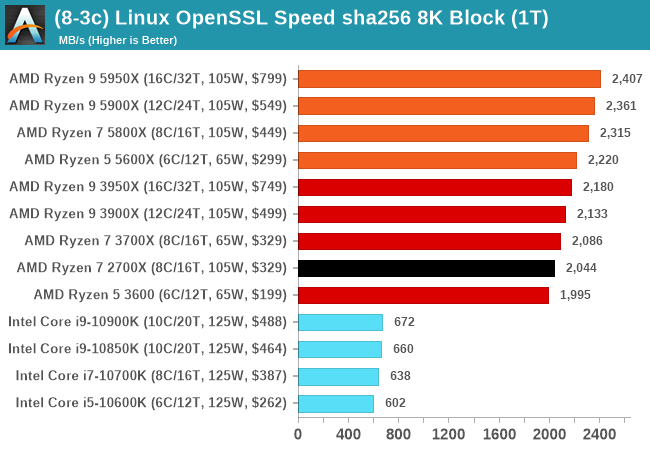
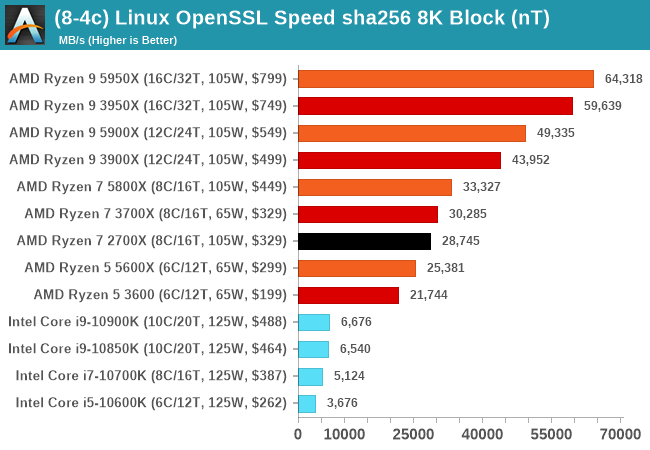
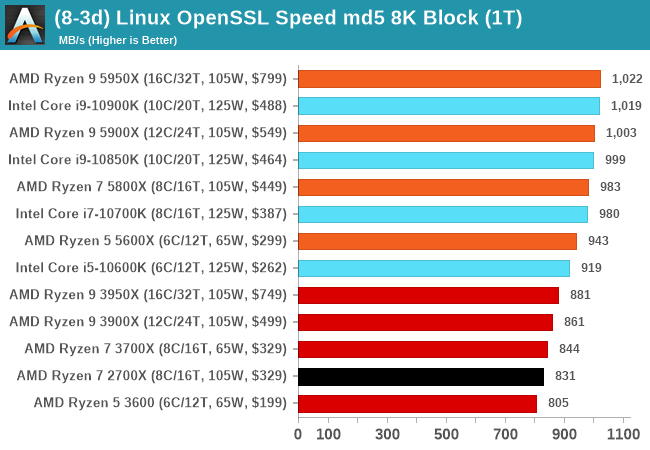
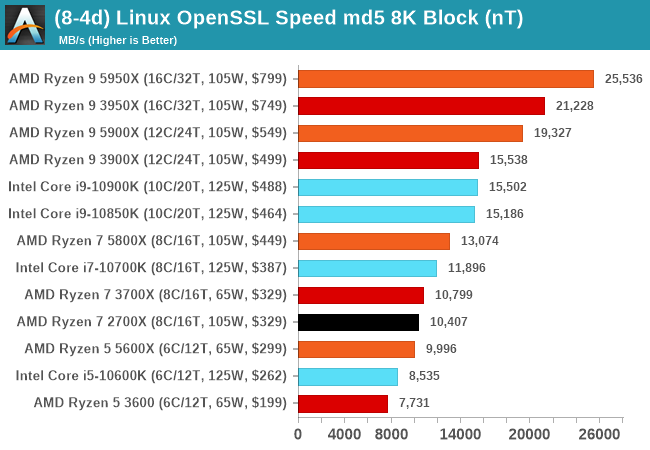
GeekBench 5: Link
As a common tool for cross-platform testing between mobile, PC, and Mac, GeekBench is an ultimate exercise in synthetic testing across a range of algorithms looking for peak throughput. Tests include encryption, compression, fast Fourier transform, memory operations, n-body physics, matrix operations, histogram manipulation, and HTML parsing.
I’m including this test due to popular demand, although the results do come across as overly synthetic, and a lot of users often put a lot of weight behind the test due to the fact that it is compiled across different platforms (although with different compilers).
We have both GB5 and GB4 results in our benchmark database. GB5 was introduced to our test suite after already having tested ~25 CPUs, and so the results are a little sporadic by comparison. These spots will be filled in when we retest any of the CPUs.
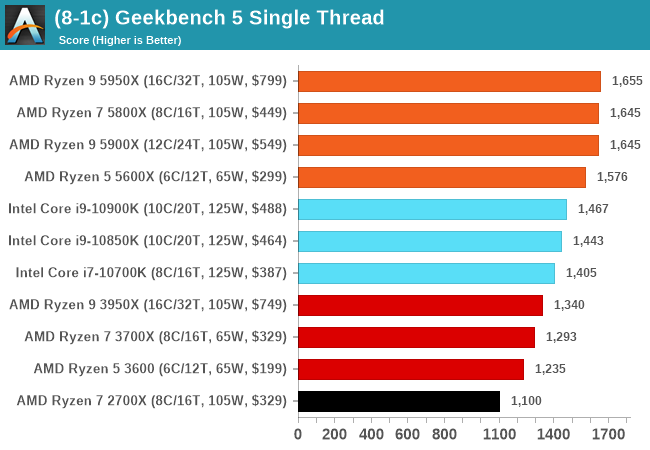
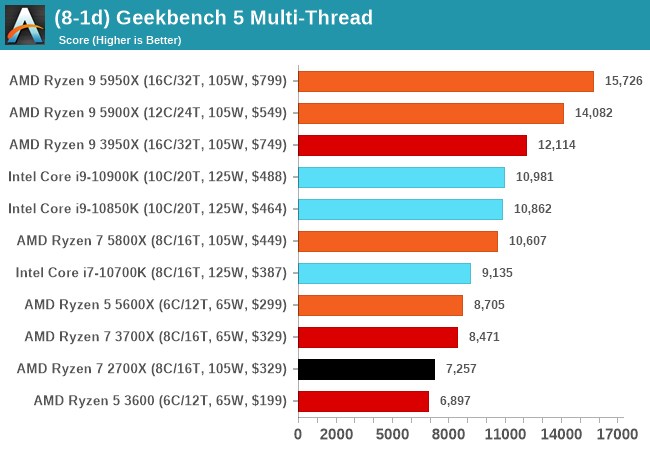










339 Comments
View All Comments
GeoffreyA - Thursday, November 5, 2020 - link
Battling to load the article for hours, but looks like it's finally working. On page 3 now.GeoffreyA - Friday, November 6, 2020 - link
Thanks for the excellent analysis, AT. Zen 3 has delivered, even more than expected. Brings back memories of the Athlon 64 FX-51 at the top of charts and later the Core 2 Duo, which left K8 dead on the floor. I am impressed by the IPC's having gone up so much but power remaining roughly the same. And, besides the widening, surprisingly conservative, there are a lot of "intelligent" techniques bringing about improvement (reminiscent of the Pentium M in a way). All in all, outstanding work from AMD. The engineers deserve a round of applause.GeoffreyA - Saturday, November 7, 2020 - link
Ian, not sure if I missed it, but what version of Windows does the test suite use? The CPU overload article says 1909. According to Techpowerup, there have been some scheduler changes since 1903 and the difference in performance was a few per cent. for Zen 3. Thanks.https://www.techpowerup.com/review/amd-ryzen-9-590...
mjcutri - Thursday, November 5, 2020 - link
Was pleasantly surprised that I was able to pick up a 5600x from newegg this morning. It'll be a nice upgrade from my i7-3920 that I've been running for 8 years!lmcd - Thursday, November 5, 2020 - link
The thing that's so funny to me is how well Sandy Bridge E has held up. Nearly every board supports PCIe 3.0 and SATA III, quad-channel memory means it's not memory bound, and it clocks up quite well.Obviously performance per watt sucks and it doesn't game as well anymore, but the feature set is way more usable than I'd ever have expected 8 years later.
Spunjji - Sunday, November 8, 2020 - link
It was a really solid platform. Throw in an SSD on PCIe and you wouldn't miss an awful lot from a more modern system, but it looks like that point has finally been reached... 8 years later!lmcd - Monday, November 9, 2020 - link
I wish both Intel and AMD would bring prosumer platforms back. While obviously SLI and XF are dead, PCIe lanes are nice to have and I/O futureproofing is actually impossible anymore.Qasar - Tuesday, November 10, 2020 - link
id just like to see more PCIe lanes. maybe 8-16 more ?Vitor - Thursday, November 5, 2020 - link
The craziest thing is that AMD has a very easy upgrade path with 5nm being avaible.CrystalCowboy - Thursday, November 5, 2020 - link
5 nm, DDR5, PCIe 5, USB4. These are all obvious future developments. They will do a new socket for that; will be interesting to see what they do with that.